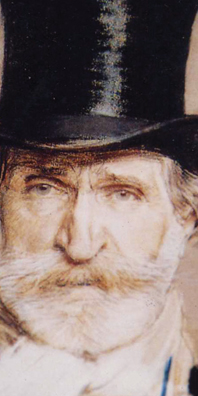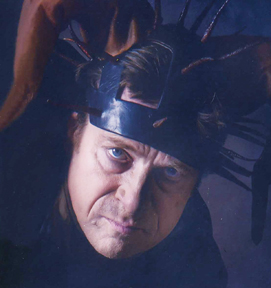Verdi's spirit on main stage
by Gwen Herat Royal Opera London
Autumn or not my friends and I managed to steal a march over Verdi at
the Royal Opera.
|

Simon Keenlside as the ill-fated Rigoletto in the Royal
Opera's
Rigoletto in the main stage. |
If you love opera, then you will love Verdi. If you love Verdi, then
you will love opera and that is the bottom line connecting opera with
Verdi.
But I am different. I love Verdi but I hate opera. Will someone come
to my rescue and extricate me from the claws of Rigoletto.
But Rigoletto is sensational and one of Verdi's excellent suites
mounted by the Royal Opera on its main stage.
The opera stretches to about three hours with two intervals in
between which I thought was quite unnecessary with the cold wind outside
and wasting around 10 to 15 minutes and also breaking the magic spell of
an opera that had a brilliant cast, especially the imposing Rigoletto.
It is Verdi's drama of seduction and betrayal along with revenge but
with a blend of great beauty and ugliness as the story unfolds to expose
the corruption and torments. The highly charged emotion that lies
between the decadent splendour of Mantua in the Renaissance.
The story value
Scored in 1851, it is the traumatic story of a jester hunchback
called Rigoletto whose beautiful daughter Gilda is seduced by libidinous
Duke of Mantua. Apparently, nothing is mentioned about the incident
except for the fact that the score is hailed and praised as one of
Verdi's best works.
It is about the finest manifestations of Verdi's genius. In a
combination of dramatic conception, the delineation of character, this
score excels not only in all the operas that preceded it but most of the
operas that succeeded it.
Not that in any way Verdi willed it to be so but just that the opera
exploded into fame and appreciation. If ever there had been an
inspiration, Rigoletto constitutes such a one.
The five best known numbers of it are often performed separately,
enforcing a mistaken view that they are ‘set’ pieces and not integrated
into the drama of the story. Yet, La donna e’ mobile, ‘Quest’ o quella,
Caro Nome, Pari siamo and the great Quartet are the finest of all
operas.
In 1853 Rigoletto by itself was enough to establish his name as an
iconic composer of operas but Verdi is most remembered as another
Mascagni or Leoncavallo. This put him among the importance of classical
opera.
The night's production that was first performed in 2001 comes with no
change. It is as original as it was and sung it Italian with English
subtitles. It is a drama filled with love, deception, revenge, tragedy
and Verdi's first Masterpiece, containing some nude scenes of sexual
nature.
Rigoletto crackles with excitement and for those like me who are
bored by opera, it is a welcome change.
This ill-fated triangle of the crippled jester and his innocent
daughter and their philandering master vividly displaying their
individual histronics, is headed by the Italian specialist.
Maurizio Benini who conducts a cast that includes Simon Keenlyside as
the singing Rigoletto for the Royal Opera for the first time following
his triumphant role in Vienna and with the Welsh National Opera.
Alexander Kurzak sings Gilda for the first time with the young star.
Saimir Pirgu as the flirting Duke.
The first day performance is followed by another cast two days later
with Dimitri Platanias as Rigoletto and Eri Nakamura as Gilda. The
scores remained the same except for the highly enhanced Act 111 quartet
which is a real feast for the eyes and ears.
With the Royal Opera Chorus and the Orchestra of the Royal Opera
House.
|

Giuseppe Verdi. |
Giuseppe Verdi (1813-1910) unmistakably the best ever opera composer
from the Early Romantics was born in the Duchy of Parma, near Busseto
and was laid to rest in Milan during which time he rose to be the most
mesmerising operatic composer of Italy.
After studying formal music at the Milan Conservatory, he failed the
entrance examination due to lack of piano technique and technical
knowledge, was considered insufficiently gifted but he was an ambitious
young man who took private lessons from Vincenzo Lavigna and thoroughly
mastered counterpoint, fugue and canon which were to prove his greatest
assets and launch his spectacular career.
He was turned down for the post of Mastro-di-Musica in Busseto but
instead appointed as Director of the Philharmonic Society. This was the
opening he was waiting for and never had to turn back on his fabulous
career. He married Margherita Barezzi. Daughter of his Patron of Music.
Tragedy struck when their two infants died followed by his young wife
from the deadly encephalities.
He was only 27 but in the following four years, he wrote music
profusely and moved over to Milan and in La Scala mounted some of his
magnificent pieces such as Bonifacio, Oberto. Later he was to write
Nebucco that rings around the concert halls even today along with
Rigoletto.
He married soprano Giuseppina Strepponi after living with her for
over seven years. His marriage followed many great compositions that
included Don Carlos and Falstaff. He died following a stroke at 87 and
quarter million followed his cortège to his resting place. |

